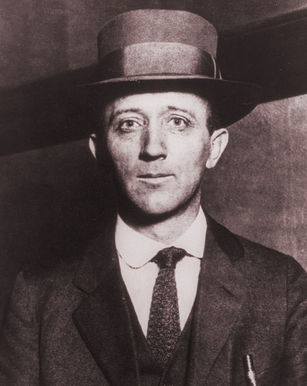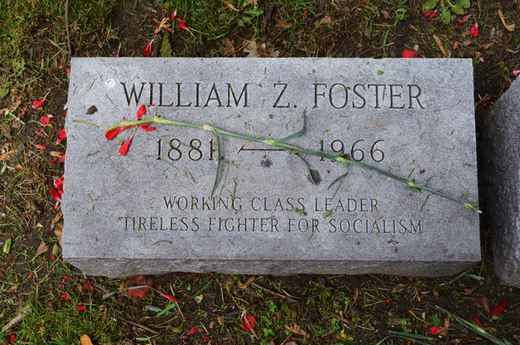William Z. Foster
(1881-1966)

Foster is a giant in the history of the U.S. working-class movement. He was born into a poor Irish family in Taunton, Massachusetts, and began work at age seven selling newspapers. He subsequently worked in dozens of other jobs all over the country and on the high seas, many which are described in his book, Pages From a Worker's Life.
Foster was a top-notch union organizer and played a vital part in many strikes.
He worked with the IWW, the American Federation of Labor (AFL), the Railroad Brotherhood, the Congress of Industrial Organization (CIO) and various independent unions. He was a founder of the Trade Union Educational League (TUEL) in 1916, and was tireless fighter for industrial unionism and working-class unity.
In 1917, Foster worked with others to organize workers in the meatpacking industry— the first mass-production industry to be organized. This industry was the most difficult to organize because of its multi-national and multi-racial work force. Soon after, with reluctant help from AFL leader Samuel Gompers, Foster tried to organize the steelworkers. The Great Strike of 1919 came under attack by Attorney General A. Mitchell Palmer as a "Red Menace". The strike was broken when Gompers withdrew his support. Bitter but not defeated, Foster went on to help organize for the United Mine Workers.
In 1921, Foster became a member of the CPUSA and was it's candidate for president in 1924, 1928 and 1932. He played a leading role in the CPUSA for many years, and was a key figure in its reconstitution, after it was temporarily dissolved by Earl Browder in1946. A working-class intellectual, Foster was a prolific author, writing major books, including two autobiographical volumes and scores of pamphlets. Books include; History of the Other Americas, The Great Steel Strike and its Lessons, Negro People in American History and History of the Communist Party USA.
Foster was a top-notch union organizer and played a vital part in many strikes.
He worked with the IWW, the American Federation of Labor (AFL), the Railroad Brotherhood, the Congress of Industrial Organization (CIO) and various independent unions. He was a founder of the Trade Union Educational League (TUEL) in 1916, and was tireless fighter for industrial unionism and working-class unity.
In 1917, Foster worked with others to organize workers in the meatpacking industry— the first mass-production industry to be organized. This industry was the most difficult to organize because of its multi-national and multi-racial work force. Soon after, with reluctant help from AFL leader Samuel Gompers, Foster tried to organize the steelworkers. The Great Strike of 1919 came under attack by Attorney General A. Mitchell Palmer as a "Red Menace". The strike was broken when Gompers withdrew his support. Bitter but not defeated, Foster went on to help organize for the United Mine Workers.
In 1921, Foster became a member of the CPUSA and was it's candidate for president in 1924, 1928 and 1932. He played a leading role in the CPUSA for many years, and was a key figure in its reconstitution, after it was temporarily dissolved by Earl Browder in1946. A working-class intellectual, Foster was a prolific author, writing major books, including two autobiographical volumes and scores of pamphlets. Books include; History of the Other Americas, The Great Steel Strike and its Lessons, Negro People in American History and History of the Communist Party USA.
Additional Resources
- William Z. Foster Writings on Marxists Internet Archive.
- Trade Union Educational League documents found at the Marxist Internet Archive.
- The Question of the Unorganized William Z. Foster. 1925
- Organizational Problems of Industrial Unionism William Z. Foster.


